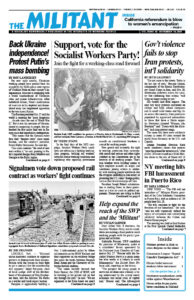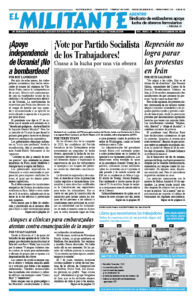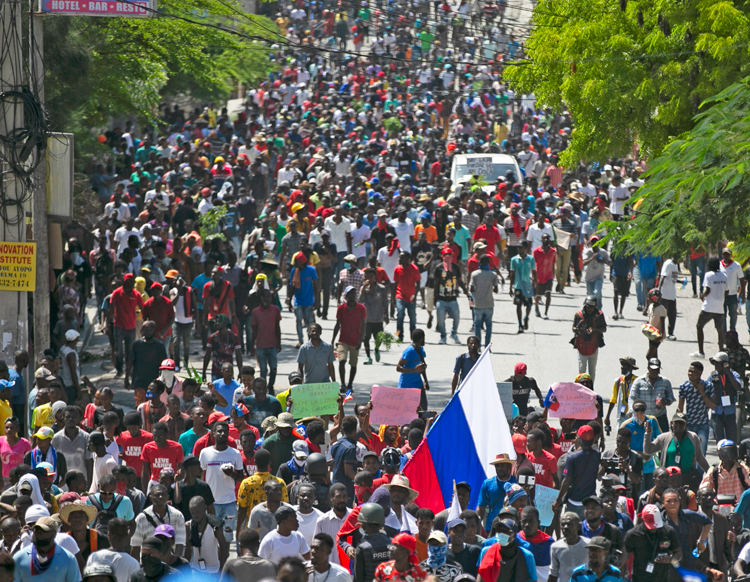Thousands marched in the Haitian capital, Port-au-Prince, Oct. 17, the latest in months of protests demanding the resignation of Prime Minister Ariel Henry amid Haiti’s deep political, economic and social crisis.
With Washington’s backing, Henry became prime minister in July 2021 after the assassination of President Jovenel Moise. Haiti has not held an election since 2016 and the terms of the members of the National Assembly expired in 2021. Henry, like Moise — who was elected president in 2015 with just 10% of the eligible voters casting ballots — rules by decree.
Competing bourgeois forces are vying to replace the current government, promising a road to elections and capitalist stability.
Trying to keep his grip on power, Henry has called on the United Nations and Washington to intervene. Washington’s proposal, supported by U.N. Secretary-General Antonio Guterres, is for a multinational force — but not U.S. troops — to be deployed to “assist” Haiti’s national police. The Canadian government sent officials to Haiti Oct. 27 to make an “assessment.” The prime minister of the Bahamas, Philip Davis, said he would be willing to send troops if the U.N. asks.
Among the backers of the Oct. 17 protest was Jean-Charles Moise, former mayor of Milot and the 2015 presidential candidate of Pitit Dessalines (Children of Dessaline), a bourgeois party with roots in the popular Lavalas movement that brought Jean-Bertrand Aristide to the presidency in 1991. There have also been protests in Cap-Haitien, Gonaives, Petit-Goave, Jeremie, Les Cayes and Jacmel.
Inflation in Haiti has hit 30%, a 10-year high, and the currency has lost 40% of its value this year. The cost of rice has quadrupled. The garment and textile workers’ unions took to the streets in February demanding an increase in the minimum wage.
After Henry announced the government would end $400 million in fuel subsidies, doubling the price for gasoline, diesel and kerosene, the United Front of Transporters and Workers of Haiti, and the Association of Owners and Drivers, organized a two-day nationwide strike. They joined in demanding Henry’s resignation.
Armed street gangs are in command of entire neighborhoods, controlling up to 40% of the capital. In July over 470 people were killed amid gang warfare.
Many of these gangs have ties to the police and competing wings of the capitalist class. Jimmy Cherizier, a former police officer, heads the “G9 Family and Allies” coalition of gangs that dominates in Port-au-Prince.
“The gangs were created by the same system that is now saying, ‘Oh, you must send intervention because they’re out of control now,’” Leonie Hermantin of the Sant La Haitian Neighborhood Center in Miami, told WLRN radio Oct. 12. “The same people who are asking for intervention are the same people who created, fueled, incubated those gangs.”
In September the G9 used bulldozers to create trenches to blockade the port, the Varreux fuel terminal and warehouse district in Port-au-Prince where imported food and fuel arrive. As a result, gas stations have closed, hospitals have cut back on critical services, and groceries and banks have curtailed their hours.
Cherizier is using his siege to press for the G9 to have cabinet seats. He claims he is a “revolutionary” fighting for “a new Haiti where everyone can have food and clean water.”
Sixty percent of the population lives on less than $2 a day. Nearly half of Haiti’s 11 million people face malnutrition. With a lack of food, safe drinking water and soap, health care and regular garbage collection, cholera has begun to spread.
Since the disease was first reported on Oct. 2, there have been more than 2,000 suspected cases and an estimated 41 deaths. In Haiti’s largest prison, the National Penitentiary in Port-au-Prince, there were reportedly at least 21 deaths and 147 hospitalizations from cholera Oct. 4-11.
Many Haitians reject the idea of another international intervention, noting that in 2010 U.N. peacekeepers were responsible for sparking a cholera epidemic that killed nearly 10,000 people.
U.S. troops have intervened in Haiti many times to defend U.S. imperialist interests. In 1994 U.S. forces restored Aristide to power, and in 2004 they forced Aristide out again.


